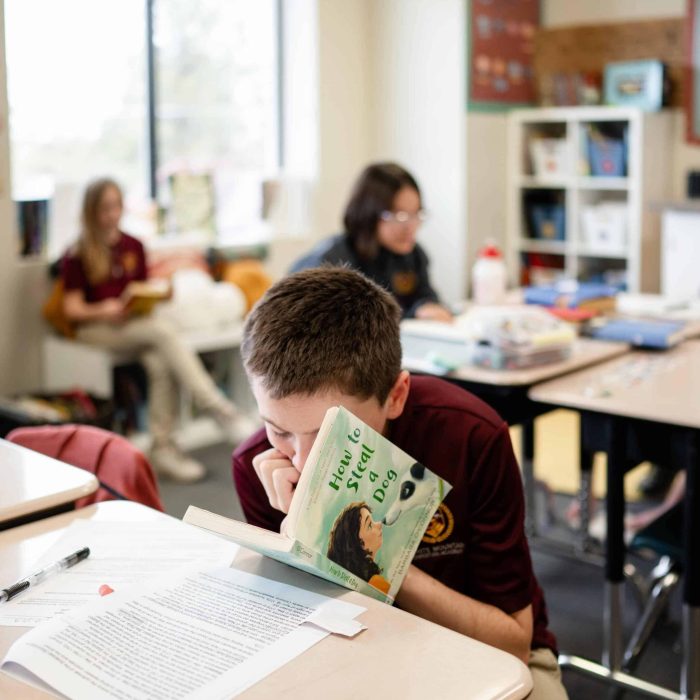

Classical education cultivates wisdom and virtue through meditation on the Good, the True, and the Beautiful. It delivers actual content.
As unique individuals made in the imago Dei, people have always understood the importance of great ideas such as truth, beauty, and goodness. Classical Christian education seeks to nurture a child’s natural wonder and curiosity about God and the universe He has created. Classical education focuses on “the great conversation” – the great ideas of philosophy, music, art, and literature, the great discoveries and events of history, and the great thinkers from Socrates to the Biblical writers to the modern age. We create a meaningful and objective context in which students are challenged to add their perspectives on these important ideas that refine thinking and character.
Words are significant to God. He conceives of himself as word, and He has communicated to us through a book and through Jesus, the word “which became flesh and dwelt among us.” Therefore, a classical Christian education model is a challenging, word-based education focusing on sources and primary documents emphasizing reading, writing, question-asking, speaking, and coming to truth conclusions. In the process, students learn how to think, knowing what they think and why they think it. By cultivating a lifelong love of learning, we desire that our students be wise and discerning thinkers who grow spiritually, artistically, and socially, as Jesus did, “in favor with God and men.”
It does not matter what we study if it doesn’t change us into virtuous human beings. A recent Harvard University president lamented that a professor could still correct someone for saying 7 X 5 = 32 but that “there now is no recognized moral knowledge upon which projects of fostering moral development could be based.” Socrates famously understood that knowledge and virtue are inseparable. Christians have always understood that “The fear of the LORD is the beginning of wisdom, and knowledge of the Holy One is understanding.”
We want our students to have the mind of Christ, to love God with heart, soul, mind, and strength, and to extend that love to others. We therefore teach our students to love the right things in the correct order (ordo amoris) -wisdom, justice, courage, temperance, faith, hope, and love- and to know when and how to exercise them properly.
Through this method, students learn about historical events, characters, stories, fables, myths, scientific facts, and mathematical proofs through a Classical education. They read whole literary works in great depth (the Great Books), and they learn to approach books with moderation to learn and to have the courage to question.
The focus here is on teaching students to know – know truth, being, wisdom, goodness, virtue – the highest causes, rather than equipping them with purely practical skills to do well at a given job.
Grades K – 4
Young children are adept at memorizing large amounts of information using chants, songs, and rhythmic verse. The youngest in this group can recite a book by heart while the older among them can rattle off verbatim whole parts of their favorite movie. The grammar stage makes great use of this natural ability to give children a firm foundation of facts in math, phonograms, natural history, geography, science, etc. The students are given information, much of which is retained for a lifetime.
Grades 5 – 8
As a child matures, they become naturally adept at argument (which is why pre and early teens begin to question authority). In the dialectic stage, children learn the ins and outs of formal logic. Logic enables them to assimilate the facts they learned in the grammar stage into a more thorough and cohesive understanding of their subjects, arranging their thoughts in a rational and meaningful way. Students are taught how to reason through their questions and come to understand that disagreement need not be disagreeable.
Grades 9 -12
Students have now honed their Socratic skills of asking questions and questioning answers, enabling them to engage the dominant ideas of past and present cultures. The goal of classical Christian education is not to just graduate students with high GPA’s, who attend the best colleges and universities, or who pull down high-paying jobs (although this form of education produces such students). The crowning jewel of classical Christian education is raising individuals who impact their generation and generations to come with the knowledge, understanding, and wisdom found in the Gospel of Christ.

WMCA partners with Christian families, churches, and faculty to provide the best Christian education possible for all students and to walk with them as they grow in Christ.